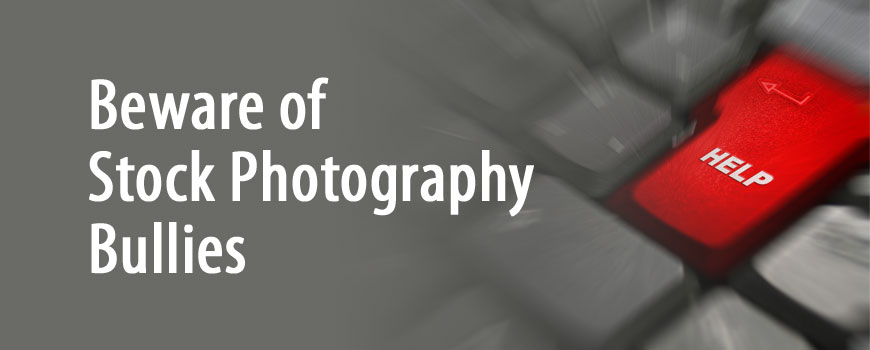
Beware of Stock Photography Bullies
As the saying goes “a photo is worth a thousand words”. However, in the age of stock photography licensing “a photo is worth a thousand dollars”. Photos and other digital images are used to enhance websites by conveying a certain message, can be used to break up multiple paragraphs of text, added to promotional print material, used in social media ads and more. One piece of advice I always give to our clients that want to find their own images is to always check the license agreement for all photos or digital assets. It is common to simply search on the Internet to find a good image, however if the license agreement does not clearly state that it is free to use, then most likely there is a required license fee. (Note: if you hire your own photographer or graphic designer, they will have their own contract, license or royalty agreement.)
In recent years, stock photography and image licensing has become big business. Licenses to use images, illustrations, and even videos can be purchased from $5.00 to over $500 (depending upon how the digital asset will be used). However, the downside of this is that without proper knowledge, an innocent person can be harassed or bullied by a stock photography company (real or fake) demanding back-payment for the use of a digital asset without a proper license or royalty agreement. These fees can range from hundreds to thousands of dollars.
Recently one of our clients was being consistently harassed by a company (who we will refer to as the Photo Bully) for having an image sitting on their web hosting server. The Photo Bully stated that this image was under their license agreement (or that of their client). This image was not used on the website (not visible) but was part of demo data that came packaged with a WordPress theme. Demo data is very common as it gives the end user an example of the layout options and functionality of the theme. From there the theme can be customized and/or re-programmed per the client’s specifications.
We (Sirius Web Solutions) decided to step in on our clients behalf because: 1) the image was not public, 2) the theme was legally purchased from a reputable company and 3) the demo data and associated images where packaged with the theme by the theme’s developer. We did some research to make sure that the Photo Bully was a legitimate company before proceeding. They appeared to be legitimate and depending on how this matter played out, we might have needed to file a complaint with the Better Business Bureau. After contacting the Photo Bully, they tried to insist that it was our client’s responsibility to make sure all images had the proper license. Of course this did not make sense as it is the responsibility of the theme’s developer to ensure all demo images have the proper license and if not, it should be clearly stated that the demo images should not be used publicly and be deleted from the hosting server.
From this point we deleted all demo images that came packaged with the theme from the hosting server and reiterated to the Photo Bully that it was not being used on the website. We sent a copy of the receipt (to prove that the WordPress theme was legally purchased), the contact information of the company where the theme was purchased, and the contact information of the theme’s developer. When the Photo Bully received this information they stated that these companies could contact them or they would be willing to settle for $450. Of course this was not sufficient for us as there was no wrong doing on the part of our client. We then decided to e-mail the company where the theme was purchased explaining this situation, as they have their own legal team to deal with Photo Bullies. There was a request from the company to see the image and any supporting documentation from the Photo Bully. So in our response we copied all involved parties in an e-mail message (the company where the theme was purchased, our client and the Photo Bully)….and we haven’t heard back from the Photo Bully.
So the moral to this story is when acquiring images, themes or any digital asset:
- Always read and completely understand the license and/or royalty agreement.
- Keep copies of all receipts from the purchases of digital assets.
- If you are contacted by a Photo (or digital asset) Bully, always ask for proof of the license breach and other supporting documentation. When responding to them include the company and/or person where the digital asset was purchased as they would be responsible for making sure all accompanying digital asset licenses are in place (this will help keep a virtual paper trail).
- If you are contacted by phone ask for all communication to be in writing via regular mail or e-mail. If they refuse then be skeptical because it might be a scam to get money.
We hope you find this information useful and feel free to contact us if you have further questions or would like recommendations for reputable digital asset companies.

